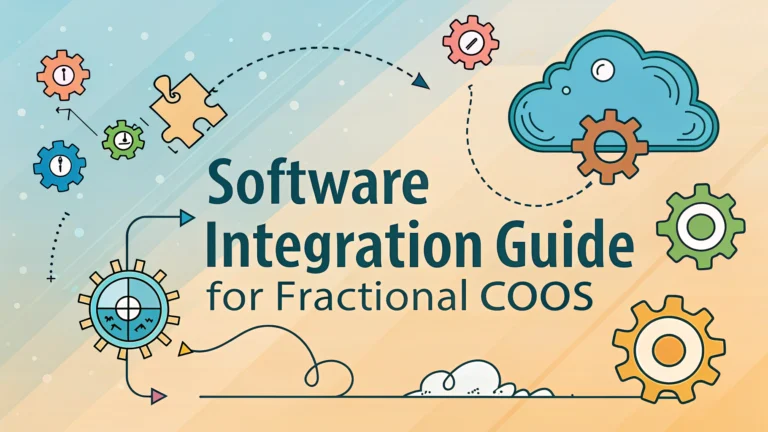A software integration guide helps fractional COOs streamline technology implementation and maximize operational efficiency across organizations.
The right software integrations can reduce manual work, eliminate data silos, and create automated workflows that save both time and resources.
This guide outlines practical steps and best practices for fractional COOs to evaluate, implement and maintain effective software integrations.
Key Software Integration Areas
- Enterprise Resource Planning (ERP) systems
- Customer Relationship Management (CRM) platforms
- Project Management tools
- Financial & accounting software
- HR & payroll systems
- Business Intelligence tools
Assessment & Planning
Start with a thorough audit of existing systems and processes to identify integration needs and opportunities.
Document current workflows, pain points, and manual processes that could benefit from automation.
Create a prioritized list of integration projects based on potential ROI and resource requirements.
Technical Requirements
- API availability and documentation
- Data format compatibility
- Security protocols and compliance requirements
- Scalability needs
- Integration maintenance demands
Implementation Steps
- Select appropriate integration tools or platforms (Zapier, Workato, MuleSoft)
- Develop detailed integration specifications
- Create test environments
- Build and test integrations
- Train staff on new workflows
- Monitor and optimize performance
Common Integration Challenges
- Data synchronization issues
- API rate limits and quotas
- Version control and updates
- User adoption resistance
- Security concerns
Best Practices
Implement proper error handling and logging mechanisms to track integration performance.
Create detailed documentation for all integrations, including setup procedures and troubleshooting guides.
Establish a regular maintenance schedule to review and update integrations.
Recommended Tools
| Category | Tools |
|---|---|
| Integration Platforms | Zapier, Integromat, Workato |
| API Management | Postman, SwaggerHub, Apigee |
| Monitoring | DataDog, New Relic, Grafana |
Moving Forward with Integration Success
Regular reviews of integration performance metrics help identify areas for optimization.
Stay current with software updates and new integration capabilities to continuously improve operational efficiency.
Build a feedback loop with end-users to gather insights for future improvements.
Connect with integration platform support teams for technical assistance – Zapier Support: [email protected], Workato Support: [email protected].
Measuring Integration Success
Track key performance indicators (KPIs) to evaluate integration effectiveness:
- Processing time improvements
- Error reduction rates
- Cost savings
- User productivity gains
- Data accuracy metrics
Security & Compliance
Data Protection Measures
- Implement end-to-end encryption
- Regular security audits
- Access control protocols
- Data backup procedures
Compliance Requirements
- GDPR considerations
- Industry-specific regulations
- Data residency requirements
- Audit trail maintenance
Scaling Integration Architecture
Plan for growth by implementing scalable integration solutions that can handle increased data volumes and new system additions.
Consider microservices architecture for more flexible and maintainable integrations.
Training & Documentation
- Create user manuals and training materials
- Develop troubleshooting guides
- Maintain integration architecture diagrams
- Document API dependencies and versions
Maximizing Long-Term Integration Value
Successful software integration is an ongoing journey that requires continuous attention and refinement.
Regular stakeholder communication ensures integrations continue to meet evolving business needs.
Build a culture of innovation that embraces new integration possibilities and technological advances.
Remember that well-executed integrations form the backbone of efficient, scalable operations.
FAQs
- What is a Fractional COO and how does it differ from a full-time COO?
A Fractional COO is a part-time Chief Operating Officer who works with multiple companies, providing strategic operational leadership on a contract basis. Unlike full-time COOs, they typically work 10-20 hours per week per client and bring diverse industry experience from multiple organizations. - How do Fractional COOs integrate with existing software systems?
Fractional COOs assess current software stacks, identify gaps, implement new solutions, and optimize existing systems. They typically focus on ERP systems, project management tools, collaboration platforms, and workflow automation software while ensuring seamless integration between different applications. - What are the key software platforms that Fractional COOs commonly work with?
Common platforms include ERP systems like NetSuite or SAP, project management tools like Monday.com or Asana, communication platforms like Slack or Microsoft Teams, and workflow automation tools like Zapier or Automate.io. - How do Fractional COOs handle data security when working across multiple organizations?
They implement strict data segregation protocols, use separate secure login credentials for each client, maintain confidentiality agreements, and follow industry-standard security practices including two-factor authentication and VPN usage. - What is the typical software integration timeline when working with a Fractional COO?
Software integration typically takes 3-6 months, beginning with assessment (2-4 weeks), planning (2-3 weeks), implementation (6-8 weeks), testing (2-4 weeks), and optimization (4-6 weeks). - How do Fractional COOs ensure smooth software adoption among existing staff?
They develop comprehensive training programs, create documentation, provide hands-on support, establish clear communication channels, and implement change management strategies to ensure successful software adoption. - What are the common software integration challenges faced by Fractional COOs?
Common challenges include legacy system compatibility, data migration issues, resistance to change from employees, budget constraints, and maintaining business continuity during implementation. - How do Fractional COOs measure the success of software integrations?
Success is measured through KPIs including reduced operational costs, improved processing times, increased productivity, reduced error rates, user adoption rates, and ROI on software investments. - What level of technical expertise should a Fractional COO possess?
Fractional COOs should have strong technical literacy, understanding of major business software platforms, experience with system integration, knowledge of data security best practices, and ability to translate technical requirements into business solutions. - How do Fractional COOs handle software vendor relationships?
They manage vendor selection, contract negotiations, service level agreements, ongoing support requirements, and maintain relationships with key software partners while ensuring optimal pricing and service delivery.







